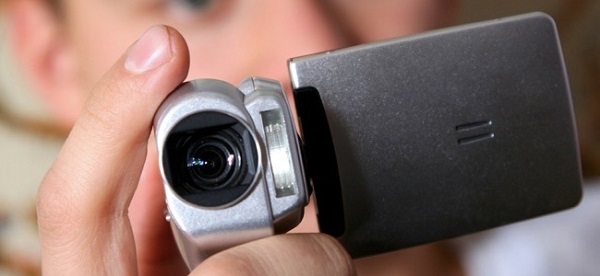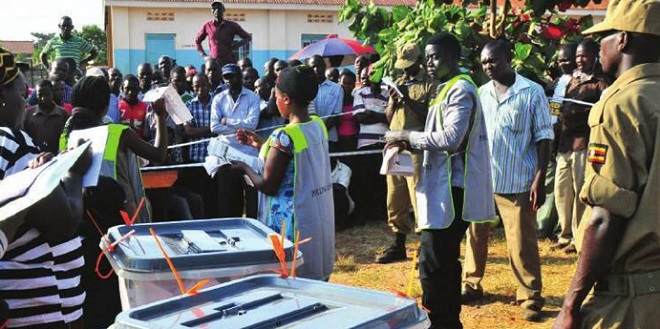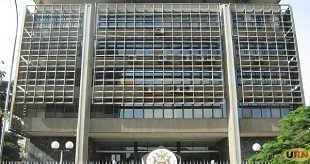
📌 Election offences and penalties
✳ Voting on behalf of another person (living or dead) ▶ Prison 5 years
✳ Preventing a person from voting ▶ Fine sh100,000
✳ Voting more than once is an offence and on conviction ▶ Fine sh500,000
✳ Refusing to have one’s fingers to be inspected ▶ Fine sh100,000
✳ Election official wrongly counting vote ▶ Fine sh500,000
Kampala, Uganda | THE INDEPENDENT & URN | The Electoral Commission (EC) has urged voters to uphold the principle of a secret ballot by avoiding use of camera’s in voting booths.
Paul Bukenya, the EC spokesperson has asked the voters to be responsible not to take pictures or photographs and share them with others as the law does not allow that.
He said it is stipulated in the Electoral Commission voter education handbook that “while voting is done in the open; marking the ballot is secret – your choice is secret (p.35).”
He says voters should keep their ballot secret for one’s safety and desist from exposition of persons one will have voted for in the 2021 general elections. ( READ FULL EC STATAMENT HERE – CLICK)
A cross-section of voters and political candidates oppose the move by the Electoral Commission to ban the use of cameras and smartphones within polling stations.
Rebecca Kidaaga, a voter from Kabuwoko village in Lusanja says people should be allowed to move with their phones as it is a personal gadget for communication.
She says people have always voted without taking photos, but law enforcers may harass voters carrying phones for taking pictures at the polling stations.
John Mwesigwa, a voter from Kisugu in Makindye division says people have many gadgets to read while at the polling stations that the EC cannot control. He wonders how the election law enforcers will monitor voters with recording gadgets that are not easily seen.
Joseph Kabuleta, a presidential candidate says that the pronouncement is a bad move and could frustrate the need for transparency during elections.
He says his team planned to have all his agents equipped with smartphones to capture events of the day. He hastens to add that the ban raises questions on the integrity of the process and resurfaces fears of intended vote-rigging.
Nancy Linda Kalembe, an Independent Presidential Candidate says she is more concerned about the safety of the ballot, adding that having such gadgets in place tantamount to having a polling agent.
She adds that it is unfortunate that gadgets are banned in the digital era, where even the EC is encouraging virtual campaigns, virtual activities, and less human to human interactions.
This comes as different political camps mobilized media teams ahead of the 2021 general elections, to relay voting live on various platforms using the mobile phones, but the Electoral Commission had earlier banned the use of cameras and smartphones in the precincts of polling stations across the country.
On January 14, 2021 Ugandans are going to the polls to vote presidential and parliamentary candidates.
Other election offences

A handout released by the Electoral Commission last years highlights the offences, quoting from the Presidential Elections Act 2005, as amended, Parliamentary Elections Act 2005, as amended, Electoral Commissions Act Cap 140 and the Local Government Act Cap 243
📌 Other election offences and illegal practices outline in a handbook for voters are:
******
Election Officials should note the following:
▶ When an Election Officer, an Agent or Observer, at any polling station, assists any voter with a disability, he/she commits an offence.
▶ Failure by the Presiding Officer to submit voting results is an offence and the offender is liable on conviction to a fine not exceeding 100,000/= (One hundred thousand shillings) or imprisonment not exceeding one year or both.
▶ Preventing a person from voting is an offence and anyone who commits the offence of obstruction is liable to a fine of 200,000/= (Two hundred thousand shillings) or imprisonment for two years.
▶ Any Election Officer who knowingly counts a ballot paper in favor of the candidate for whom it was not cast, commits an offence. On conviction a person is liable to a fine not exceeding 500,000/= (Five hundred thousand shillings) or imprisonment not exceeding five years or both.
Offences by stakeholders
▶ Pretending to have a disability is an offence and any person who commits
this offence is liable to a fine not exceeding l00,000/= (One hundred
thousand shillings) or imprisonment not exceeding two years or both.
▶ Assisting a voter without authority is an offence and the offender will
on conviction be liable to a fine not exceeding 200,000/= (Two hundred
thousand shillings) or two years imprisonment or both.
▶ Voting more than once is an offence and on conviction a person is liable
to a fine not exceeding 500,000/= (Five hundred thousand shillings) or to
imprisonment not exceeding five years or both.
MORE
▶ Refusing to have one’s fingers to be inspected is an offence and the offender
is liable on conviction to a fine not exceeding 200,000/ (Two hundred thousand shillings) or to a term of imprisonment not exceeding two years or both.
▶ Voting on behalf of another person (living or dead) is an offence and on
conviction one is liable to imprisonment of five years (without option of a
fine).
▶ Selling alcohol within four hundred metres of any polling station is an
offence and any person who commits this offence is liable on conviction
to a fine not exceeding 200,000/= (Two hundred thousand shillings) or
imprisonment not exceeding twelve months or both.
▶ Any person who arms himself or herself during any part of polling day
with any arms or ammunition without lawful authority commits an offence
and shall on conviction be liable to a fine not exceeding 200,000/= (Two
hundred thousand shillings) or imprisonment not exceeding two years or
both.
▶ Preventing a person from voting is an offence and anyone who commits
the offence of obstruction is liable to a fine of 200,000/= (Two hundred
thousand shillings) or imprisonment for two years.
VOTER EDUCATION HANDBOOK (click HERE to read online)
Uganda Voter Education Hand… by The Independent Magazine
The PRESIDENTIAL ELECTIONS ACT, 2005 (click HERE to read online)
 The Independent Uganda: You get the Truth we Pay the Price
The Independent Uganda: You get the Truth we Pay the Price


